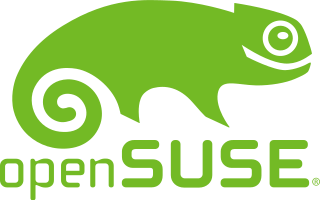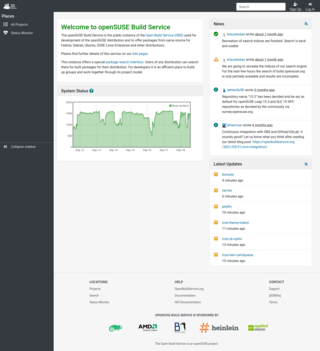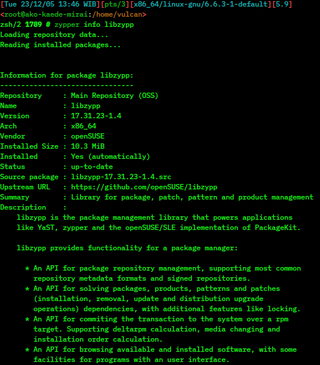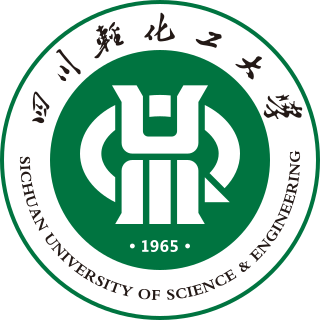
YaST is a Linux operating system setup and configuration tool.

The Yellowdog Updater Modified (YUM) is a free and open-source command-line package-management utility for computers running the Linux operating system using the RPM Package Manager. Though YUM has a command-line interface, several other tools provide graphical user interfaces to YUM functionality.
Technical variations of Linux distributions include support for different hardware devices and systems or software package configurations. Organizational differences may be motivated by historical reasons. Other criteria include security, including how quickly security upgrades are available; ease of package management; and number of packages available.

openSUSE is a free and open-source Linux distribution developed by the openSUSE project. It is offered in two main variations: Tumbleweed, an upstream rolling release distribution, and Leap, a stable release distribution which is sourced from SUSE Linux Enterprise.

SUSE Linux Enterprise (SLE) is a Linux-based operating system developed by SUSE. It is available in two editions, suffixed with Server (SLES) for servers and mainframes, and Desktop (SLED) for workstations and desktop computers.

SUSE S.A. is a German multinational open-source software company that develops and sells Linux products to business customers. Founded in 1992, it was the first company to market Linux for enterprise. It is the developer of SUSE Linux Enterprise and the primary sponsor of the community-supported openSUSE Linux distribution project.

AppArmor is a Linux kernel security module that allows the system administrator to restrict programs' capabilities with per-program profiles. Profiles can allow capabilities like network access, raw socket access, and the permission to read, write, or execute files on matching paths. AppArmor supplements the traditional Unix discretionary access control (DAC) model by providing mandatory access control (MAC). It has been partially included in the mainline Linux kernel since version 2.6.36 and its development has been supported by Canonical since 2009.
Ceph is a free and open-source software-defined storage platform that provides object storage, block storage, and file storage built on a common distributed cluster foundation. Ceph provides distributed operation without a single point of failure and scalability to the exabyte level. Since version 12 (Luminous), Ceph does not rely on any other conventional filesystem and directly manages HDDs and SSDs with its own storage backend BlueStore and can expose a POSIX filesystem.

The Open Build Service is an open and complete distribution development platform designed to encourage developers to compile packages for multiple Linux distributions including SUSE Linux Enterprise Server, openSUSE, Red Hat Enterprise Linux, Mandriva, Ubuntu, Fedora, Debian, and Arch Linux. It typically simplifies the packaging process, so developers can more easily package a single program for many distributions, and many openSUSE releases, making more packages available to users regardless of what distribution they use. Also, product and appliance building is supported by OBS.
Kiwi most commonly refers to:

ZYpp is a package manager engine that powers Linux applications like YaST, Zypper and the implementation of PackageKit for openSUSE and SUSE Linux Enterprise. Unlike some more basic package managers, it provides a satisfiability solver to compute package dependencies. It is a free and open-source software project sponsored by SUSE and licensed under the terms of the GNU General Public License v2 or later. ZYpp is implemented mostly in the programming language C++.

The Sichuan University of Science and Engineering (SUSE) is a provincial public university in Zigong, Sichuan, China. It is affiliated with the Sichuan Provincial People's Government, and co-sponsored by SASTIND and the Sichuan Provincial Government. The university was originally established in 1965, which incorporated three other colleges to become a comprehensive university in 2003.

Dracut is a set of tools that provide enhanced functionality for automating the Linux boot process. The tool named dracut is used to create a Linux boot image (initramfs) by copying tools and files from an installed system and combining it with the Dracut framework, which is usually found in /usr/lib/dracut/modules.d.

GeckoLinux is a Linux distribution based on openSUSE. It is available in two editions: Static, which is based on openSUSE Leap, and Rolling, which is based on openSUSE Tumbleweed.
System 10 or System Ten may refer to:
This page is based on this
Wikipedia article Text is available under the
CC BY-SA 4.0 license; additional terms may apply.
Images, videos and audio are available under their respective licenses.










